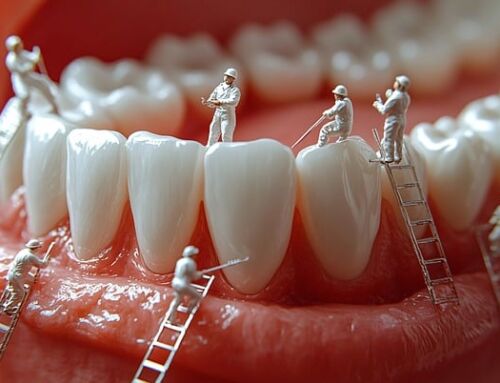If you’ve ever dealt with a tooth that’s damaged, decayed, or not as strong as it once was, your dentist may have recommended a dental crown. But what exactly is a crown? Is it just a fancy filling, or is it a more advanced solution? Is the process painful? And, perhaps most importantly, is it a permanent fix?
At Quality Dentures and Implants, we believe in offering straightforward, easy-to-understand dental care. Whether you’re seeking dental implants in Jacksonville, FL or just need to learn about dental crowns, our goal is to guide you through the process. We’re here to help you make an informed and confident decision about your treatment. Whether you’re considering a crown now or just curious about how they work, this guide will answer all your questions.
What Is a Dental Crown?
A dental crown is a custom-made cap that fits over your existing tooth. It restores the tooth’s shape, size, strength, and appearance. Essentially, the crown acts as a protective covering. It shields the tooth from further damage while also improving its function. Crowns are particularly useful for teeth that are weakened or damaged but still have a healthy root structure.
In simpler terms, think of a crown as a protective shell that restores both the look and the strength of your tooth. It’s like putting a hard hat on your tooth to protect it from future issues. With a crown in place, you can speak, eat, and smile confidently once again.
When Are Dental Crowns Needed?
Dental crowns serve a wide range of purposes. They are commonly used when:
-
Your tooth is cracked or broken: If a tooth is fractured, a crown helps reinforce it and prevent further damage.
-
A large filling has weakened the tooth: Large fillings can make a tooth more fragile. A crown will protect and strengthen the tooth.
-
You’ve had a root canal: After a root canal, the tooth becomes more susceptible to damage. A crown is placed to restore its strength.
-
Your tooth is discolored or misshapen: Crowns can be used for cosmetic improvements, especially for front teeth.
-
You are replacing a missing tooth: A dental implant is placed, and the crown becomes the visible part of the restoration.
Crowns are versatile and are often the best choice for restoring damaged or weakened teeth.
Types of Dental Crowns
There are various types of dental crowns, each designed to meet specific needs. The material used for the crown depends on factors like the tooth’s location and the required strength.
-
Porcelain or Ceramic Crowns
Porcelain crowns are a popular choice for front teeth, where aesthetics are important. These crowns mimic the natural color of your teeth, providing a beautiful, natural-looking result. While porcelain is durable, it can be more prone to chipping if subjected to heavy forces. For this reason, they are typically used for teeth that don’t bear the brunt of chewing pressure. -
Metal Alloys Crowns
Made from gold or other metal alloys, these crowns are ideal for back teeth, like molars, which experience significant pressure during chewing. Metal crowns are incredibly durable and resistant to wear. While they may not match the color of your natural teeth, their longevity and strength make them an excellent choice for back teeth. -
Porcelain-Fused-to-Metal Crowns
These crowns offer a combination of the strength of metal and the natural appearance of porcelain. The metal base ensures durability, while the porcelain exterior blends well with your natural teeth. Porcelain-fused-to-metal crowns are suitable for both front and back teeth, offering the best of both worlds. -
Zirconia Crowns
Zirconia is a highly durable material that offers strength and aesthetics. Zirconia crowns are strong enough for back teeth, yet still look natural enough for front teeth. They are a great all-around option that combines durability and a lifelike appearance.
How Does the Crown Process Work?
Getting a dental crown is a straightforward process. It usually requires two visits to your dentist. If you need tooth extractions near me before getting a crown, don’t worry – our team can help guide you through the process. Here’s what you can expect:
Visit 1: Assessment and Tooth Preparation
During your first visit, your dentist will examine the tooth to assess its health and determine the best type of crown for you. The tooth will be reshaped to make space for the crown. An impression is then taken, which will be sent to a lab where your custom crown will be made. Meanwhile, a temporary crown will be placed to protect the tooth.
Visit 2: Fitting the Permanent Crown
Once your permanent crown is ready, which typically takes 1–2 weeks, you’ll return to the office. Your dentist will remove the temporary crown and place the new one. The fit and color will be checked to ensure everything matches perfectly. Once the crown is adjusted, it will be securely cemented in place, and you’ll walk out with a restored smile.
Who Is a Good Candidate for a Dental Crown?
Dental crowns are a versatile solution and can help many patients. You might need a crown if:
-
You have a cracked or broken tooth: A crown will reinforce the tooth and prevent it from breaking further.
-
You need protection after a large filling: Large fillings can weaken the tooth. A crown will strengthen it and prevent future damage.
-
You’ve had a root canal: After a root canal, a crown is often necessary to protect the tooth from breakage.
-
Your tooth has been worn down: Teeth that are ground down due to bruxism (teeth grinding) or acid erosion can be restored with a crown.
-
You want to improve your smile: Crowns are often used for cosmetic reasons, such as fixing misshapen or discolored teeth.
Whether you’re dealing with cosmetic concerns or functional issues, dental crowns are an effective solution.
Benefits of Dental Crowns
Dental crowns offer many advantages, making them one of the most popular dental restorations:
-
Protection and Strength: Crowns encase the tooth, providing strength and protection against further damage.
-
Natural Appearance: Modern crowns, especially those made from porcelain or zirconia, blend seamlessly with your natural teeth.
-
Restored Function: Crowns restore the function of a tooth, allowing you to chew, bite, and speak without discomfort.
-
Durability: With proper care, crowns can last 10–15 years or more.
-
Boosted Confidence: By restoring the appearance and function of your teeth, crowns help improve your self-esteem.
Caring for Your Dental Crown
Caring for a dental crown is just like caring for your natural teeth. Here’s how to keep your crown in excellent condition:
-
Brush and floss daily: Be sure to clean around the base of the crown to prevent plaque buildup.
-
Avoid hard or sticky foods: While crowns are strong, it’s a good idea to avoid biting into very hard or sticky foods, especially if your crown is on a front tooth.
-
Visit your dentist regularly: Regular check-ups help ensure your crown is in good condition and that your overall dental health is maintained.
-
Report any discomfort: If your crown feels loose, uncomfortable, or shows signs of damage, contact your dentist for an adjustment.
Why Choose Quality Dentures and Implants?
At Quality Dentures and Implants, we prioritize high-quality, personalized care for every patient. Here’s why so many people choose us for their dental crowns:
-
Experienced Clinicians: Our team of skilled professionals takes the time to understand your needs and explain each step of the process.
-
Custom Crowns: We design crowns that are a perfect match for the size, shape, and color of your natural teeth.
-
Advanced Technology: We use cutting-edge tools and techniques to ensure precision and comfort throughout the procedure.
-
Affordable Care: Our flexible payment options ensure that high-quality dental care is accessible for everyone.
-
Comprehensive Services: In addition to crowns, we offer dentures, implants, and general dental care.
Fun Crown Facts
-
The Name “Crown”: The term “crown” comes from the shape of the top part of a tooth, which resembles a royal crown.
-
Crowns Have Been Around for Centuries: Some of the earliest crowns were made from materials like gold wire and ivory.
-
The Evolution of Porcelain Crowns: Porcelain crowns were developed in the early 1900s and have since become stronger and more lifelike.
-
Crown Nicknames: Some patients even nickname their crowns, adding a bit of fun to the restoration process.
Ready to Restore Your Tooth?
If you’ve been living with a cracked, chipped, or weakened tooth, a dental crown might be the solution you’ve been waiting for. Don’t wait until a small issue becomes a bigger problem. A dental crown can protect your tooth, restore its functionality, and keep your smile looking great for years.
Contact Quality Dentures and Implants today to schedule a consultation or to learn more about whether a dental crown is the right choice for you.





